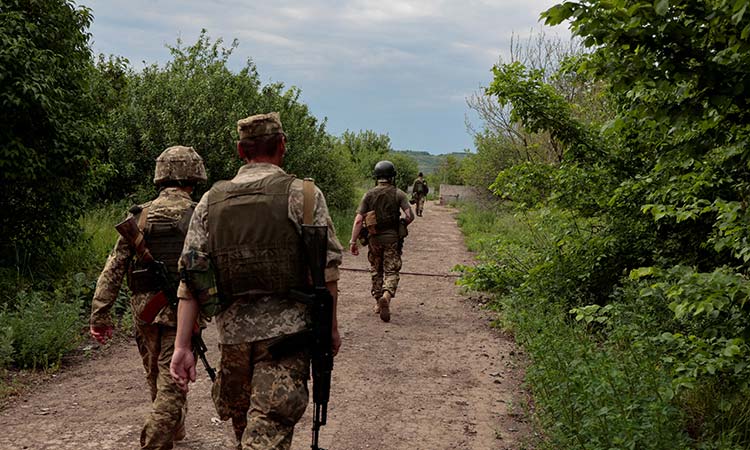Ukraine’s volunteer spirit buoys its fight against Russia


Volodymyr Zelensky
As evening falls, the streets are mostly dark in Ukraine’s capital. Russia has been systematically destroying the country’s national power grid as Western allies have dawdled over providing promised air defense systems. The whir of generators has become the new night music for the restaurants, hotels, and homes that can afford to hold back the gloom. The damage caused by the six-month congressional holdup of US arms shipments to Ukraine is raised in every conversation I have had — the lives lost and morale lowered, all while allowing Russia to go on the offensive. In the wee hours of Wednesday, five air raid warnings for Kyiv lit up my cell phone on the country’s Air Alert app. Dozens of alerts buzzed for other cities that have much less protection.
The good news: New Western supplies of missile interceptors have finally arrived. On Wednesday, they shot down the entire barrage of Russian missiles and killer drones over Kyiv, and nearly all of those unleashed on other parts of the country. But what has cheered me up early in my trip — and bolstered my faith in Ukraine’s future — is that the civilian volunteers who rose up after Russia invaded are still actively involved, helping other Ukrainians escape the fighting or getting them medical care after terrible wounds. They are not waiting for US government aid to act.
I have been covering world conflicts for decades, and I have never witnessed such strong civic activism in any other country besides the United States. These grassroots movements define the difference between democratic Ukraine and authoritarian, top-down, follow-orders-or-be-killed Russia. They will be critical to any future recovery if the West helps Ukraine drive the Russians out.
A typical example: In Odesa, I visited a small metal factory where the workers were actors and stage designers in the city’s famous opera and theater house. Now, they are welding military vehicles and prototype drones. Dimitro Bogachenko began the factory several years ago with a colleague to produce sets and metal stage curtains.
“I was an actor for 15 years in musical comedy, and then stage director at the opera,” he told me. “Now I can’t remember any of the sets I designed, only the specifications for the work that we do for the army.” During the first week of the war, he and his friends began producing flak jackets with metal plates with money they raised on the Telegram app. They then armored 40 trucks and gave them to Ukrainian forces.
Their work caught the eye of National Guard Lt. Col. Sergei Sudets, who commands mobile units that patrol 157 miles of southern coastline to protect against drones. He shaped the volunteers into an innovative unit that repairs and repurposes old equipment to meet new needs.
“The Russian drones are flying higher now,” Sudets told me, referring to Shahed drones bought from Iran, as welders’ sparks flew on the factory floor. They are taking old Soviet machine guns from 1943, mounting them on truck beds, and modernizing them so they can strike up to three miles high, Sudets said.
As we spoke, a tall former ballet dancer in a work-stained jumpsuit passed by. These innovative artists have put together a new model of a flying attack drone, a weapon that has become crucial to compensating for Ukraine’s lack of ammunition. “Hitting drones with a range of 40 kilometers would push [Russian] artillery out of range,” said Bogachenko. “We have the people to produce them, but we lack the financing.”
They have submitted their prototype to be considered for testing and government financing, but in the meantime, the workers are still pitching in their own money. Bogachenko said his wife would be horrified if she knew how much of his salary had gone into the projects. There is still a desperate need in Ukraine’s defense system for a more organized way to scale up and fund the promising drone prototypes designed by Ukrainian civilians — a critical need if Russia is to be pushed back. The help volunteers provide army units by raising funds from their own salaries, on the Telegram app, or from family, friends, businesses, or foundations — to deliver everything from drones to used cars to night vision goggles — may not match the impact of missiles, but it is essential for morale and survival.
Equally impressive are volunteer organizations focused on aiding civilians, like Helping to Leave, a project launched by cognitive neuroscientist-turned-social worker Dina Urich to help Ukrainians escape from occupied territory, which amounts to nearly 20% of the country. “It breaks our hearts because these people have no basic rights and are treated like slaves,” she said. The sole routes to escape require obtaining a Russian passport from Russian occupation officials, then travelling through Russia and surviving terrifying checkpoints. Many would-be escapees are too old or too frightened to try.
Urich, a young woman who overcame personal health issues to take up this campaign, has to raise all the costs for extracting escapees and finding them shelter when they arrive in free Ukraine. She has 150 volunteers, often people who have been evacuated and want to give back.
“Of course, a lot of volunteers stop because they have to work, or they lose faith,” she said. Indeed, I am hearing that many contributors to volunteer efforts feel tapped out after two years of donations. But most are in it for the long haul. “This is a marathon, not a sprint,” Urich said. Ukrainians know they are involved in an existential struggle to retain their independence and freedom. They are people like the volunteers I’ve met with Ukraine TrustChain, who are rebuilding roofs of Russian-destroyed village homes, and risking their lives to rescue villagers displaced by Russia’s recent rampage through villages near Kharkiv. And so many other people spend every spare moment raising funds to help war amputees or feed families displaced by fighting.
They give the lie to Russian propaganda — too often echoed by know-nothing MAGA media in the US — that Ukraine is an authoritarian, or, absurdly, a Nazi, state. These volunteers illustrate what kind of European democracy Ukraine could be if the United States and its allies finally decided to give Kyiv the weapons it needs now — to push Russia back before it’s too late.







